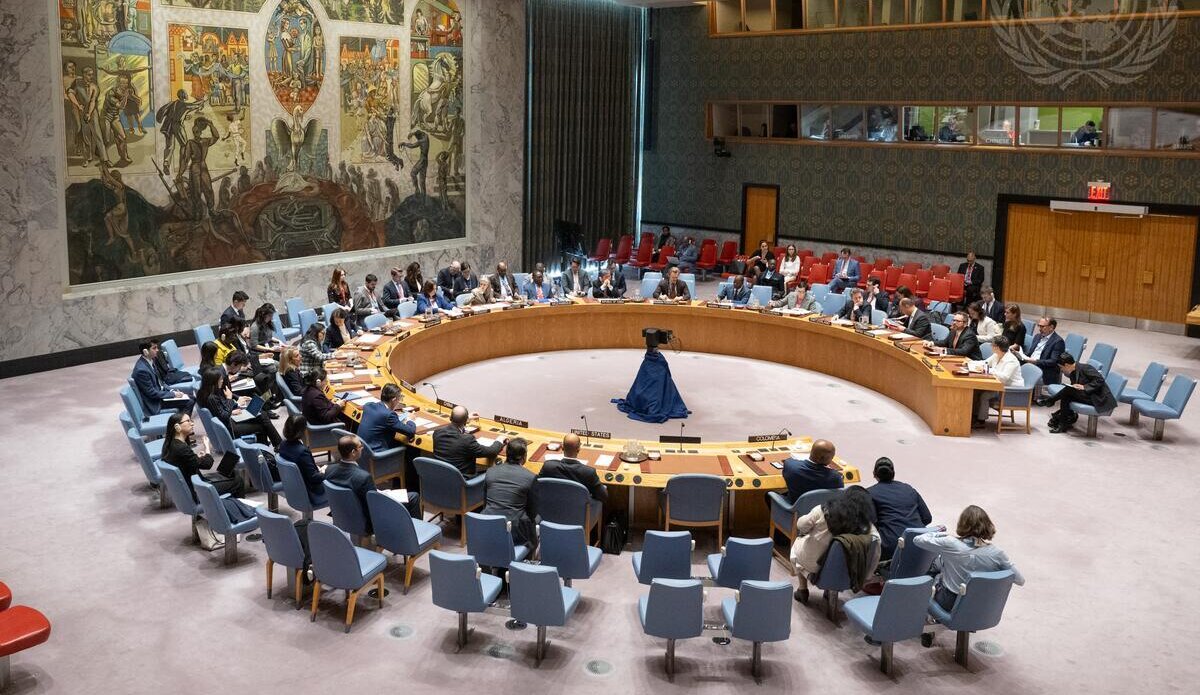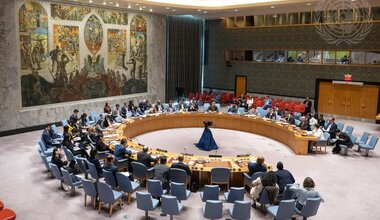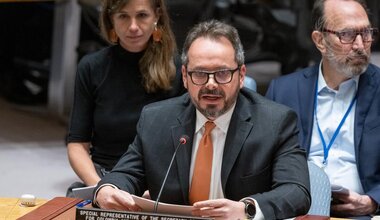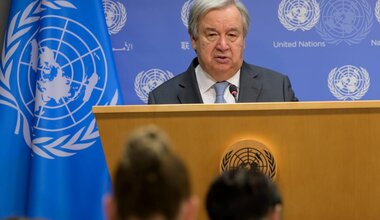The security measures of the Peace Agreement and the ceasefires need to be implemented in a complementary manner for the benefit of the security situation of communities
The security measures of the Peace Agreement and the ceasefires need to be implemented in a complementary manner for the benefit of the security situation of communities
New York, 9 April 2024. At the presentation of the UN Secretary-General’s most recent report on Colombia, covering the period from 27 December 2023 to 26 March 2024, Carlos Ruiz Massieu, Special Representative of the Secretary-General (SRSG) and Head of the UN Verification Mission in Colombia, highlighted the deep desire for peace that extends from the most vulnerable communities in the territories affected by armed conflict, across civil society, and to the highest levels of Government and State institutions. “The key challenge for transforming that aspiration into reality is to channel the abundant political will and impressive drive of civil society into ever more tangible dividends of peace on the ground”. This effort will require Colombians to overcome political divisions, based on a common interest in securing a peaceful future.
Recognizing the centrality of Colombia’s transitional justice system in achieving lasting peace, the Special Representative of the Secretary-General called attention to the delicate balance of the system, whose maintenance is critical to uphold the principle of centrality of the victims and to achieve the longed-for transition to peace.
In this regard, the SRSG highlighted the fundamental task led by the Special Jurisdiction for Peace (SJP), “which requires weighing multiple elements: rigour with celerity, as well as the rights of the victims and the legal security of those under the Jurisdiction, honoring the commitments acquired in the Agreement”. The Special Representative welcomed the fact that the SJP is getting closer to issuing its first sentences, noting that “victims require that this be done without further delay”. Likewise, the SRSG called for constructive dialogue in order to overcome, within the framework of the Agreement, the recent difficulties, as well as to foster the best conditions for this culminating and long-awaited moment for the transitional justice system.
Regarding progress in the implementation of the Peace Agreement, Carlos Ruiz Massieu recalled that the latter constitutes a roadmap to overcome some of the structural causes of conflict in Colombia. In this sense, the SRSG pointed out the distribution, formalization and restitution of land as priorities contemplated in the Agreement, as well as the delivery of public goods and services to rural areas of the country. In this regard, the Special Representative welcomed the significant budgetary increases and the Government’s efforts to deliver land and resolve related rural conflicts. He emphasized the need for continued momentum in the implementation of these provisions and the coordinated engagement of all relevant ministries and State institutions involved.
In the same vein, the Special Representative of the Secretary-General highlighted the importance of achieving concrete results concerning the goal of implementing 60% of the ethnic chapter by 2026. Likewise, he pointed out that both the latter and the gender provisions of the Agreement seek to overcome the exclusion and the consequences of the disproportionate impact of the conflict suffered by Indigenous and Afro-Colombian communities, as well as by women and the LGTBIQ+ population.
The SRSG also called attention to the need to ensure adequate resources for the implementation of the national action plan of Security Council Resolution 1325, as well as to ensure coherence between this plan and the gender provisions of the Agreement. The Special Representative also stated that the principles of the plan regarding the participation of women in ongoing peace initiatives should be taken into account, as well as considering the gender dimensions of conflict in the crafting of peace agreements.
The SRSG highlighted the fact that thousands of former FARC-EP combatants continue to firmly fulfill commitments as per the Agreement, and recognized that concrete and sustainable progress in the implementation of the Agreement has become increasingly urgent. To this end, the SRSG recommended better use of the architecture designed for the implementation of the Agreement, including the Commission for the Follow-up, Promotion and Verification of the Implementation of the Final Agreement (CSIVI). The Special Representative also called upon the Government to finalize the relevant legal instruments for the implementation of the Comprehensive Reintegration Programme, as well as of the National Reintegration System, in order to consolidate the transition of men and women former combatants to civilian life.
The SRSG recalled that security is a key element of reintegration and deplored the continued killings of former combatants, which reached 11 since the publication of the previous report, bringing the total to 416 since the signing of the Peace Agreement.
The Special Representative also expressed its deep concern over the violence faced by men and women leaders and entire communities, especially Indigenous and Afro-Colombian, who continue to suffer the impact of persistent violence and the limited presence of State institutions in various regions. The call to guarantee security is a common concern of ethnic groups, local authorities, civil society and the private sector.
Regarding the bilateral ceasefires, the SRSG noted that they are an important step in building confidence in the negotiations and in reducing violence, noting that “however, they are not a substitute for the State’s security policies aimed at providing protection and welfare to conflict-affected communities. On the contrary, these efforts should be complementary”.
Concerning the negotiation table between the Government and the National Liberation Army (ELN), the Special Representative of the Secretary-General affirmed that he hopes that the parties can assess the implementation of what has been agreed to date and make decisions to move forward with the agenda agreed to in the Mexico Agreement. “I trust that the parties, with the firm support of the international community, will be able to overcome the difficulties of the current situation and reaffirm to Colombian society the commitment of the national negotiation table to reach definitive agreements with tangible benefits for the communities”.
In reference to the dialogues between the Government and the group known as Estado Mayor Central (EMC), the SRSG urged the parties to remain focused on resolving their differences at the negotiation table, building on the progress made so far and giving clear signs of their will for peace. The Special Representative stressed that “any hostility against the civilian population sends the opposite message. It erodes trust between the parties and society”.
Finally, the Special Representative recalled that the visit of the United Nations Security Council last February was an expression of support for the courageous efforts being made in Colombia in the search for peace and affirmed that the visit gave a necessary encouragement to various sectors of society to persevere in their work for peace.
***
 UN
UN





